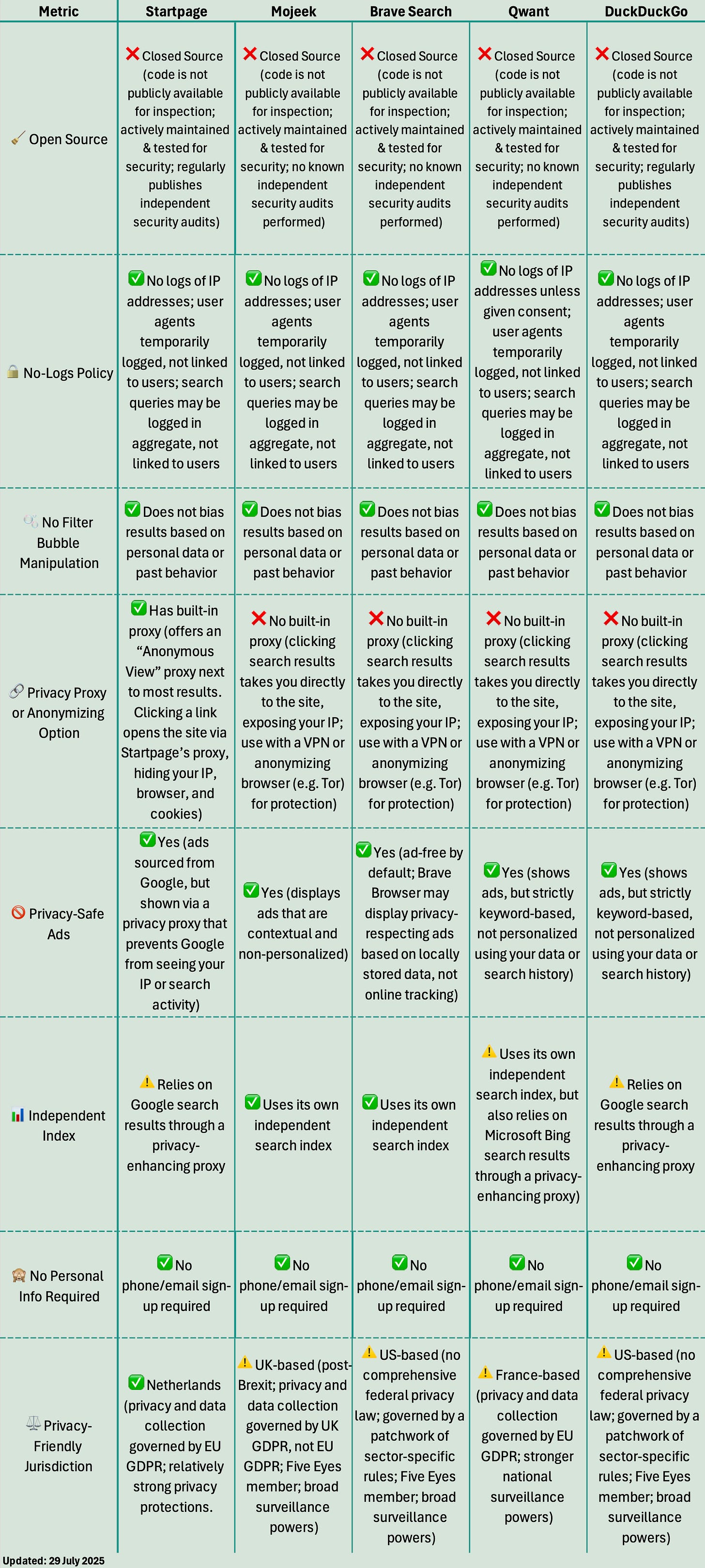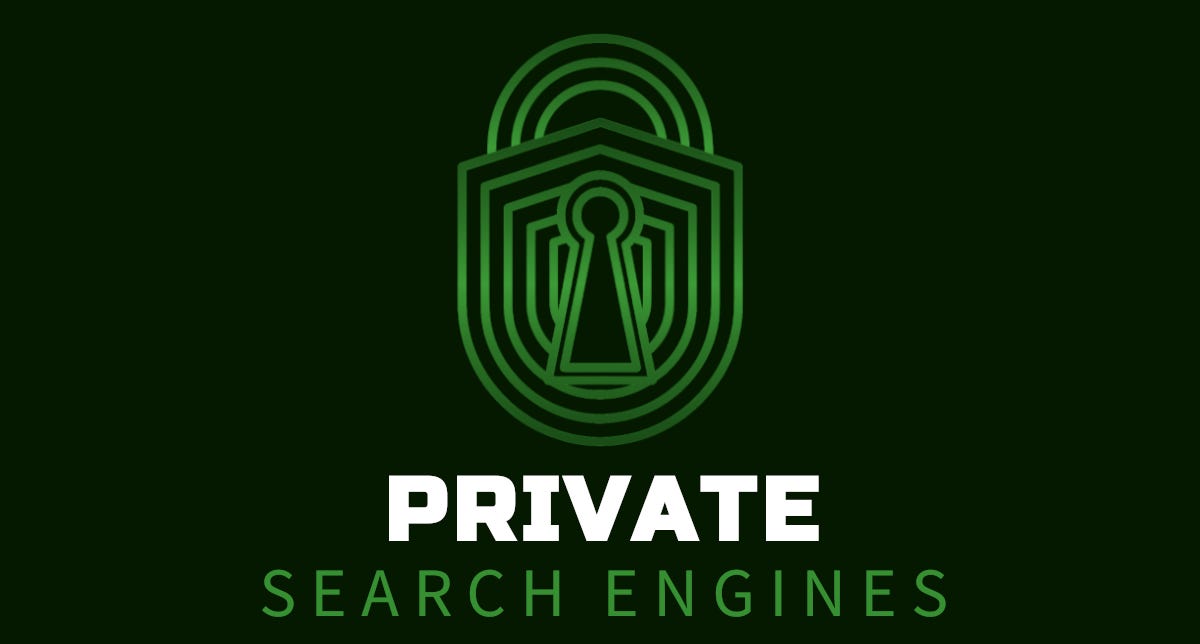Private Search Engines
What They Are, Why They Matter, and How to Choose and Use Them
In today’s digital landscape, protecting your privacy isn’t just a technical concern, it’s a human rights issue. With a background in law and a strong interest in digital rights and security, I believe privacy should be a right that everyone can understand and protect, regardless of their technical background.
This newsletter is designed to teach everyday users simple, practical steps to better protect their digital footprint and regain a bit more control online. Along the way, it explains important concepts so we can better understand how our data moves and how to keep it safe.
Private Search Engines
What They Are, Why They Matter, and How to Choose and Use Them
What is a private search engine?
A private search engine lets you look up information online without tracking your searches, building a profile on you, or selling your data. Unlike popular engines like Google or Bing—which log your IP address, search history, location, and behavior to create detailed user profiles—private search engines remove personally identifiable information and reject surveillance-based advertising models.
Why should you care?
Because your search history reveals who you are, what you’re thinking, and what you care about. When it’s collected, it can be used to build a detailed profile of you and sold to advertisers, data brokers, the government, or other third parties.
Mainstream search engines collect and monetize data like:
Your exact search terms and timestamps (i.e., the exact date and time you performed each search).
Your click behavior, scroll patterns, and link choices
Your IP address and location
Your device and browser
Your full search history, often tied to an account (even in “incognito” mode)
This data is used to:
Build detailed behavioral profiles
Target you with ads and shape your decisions
Feed algorithmic filter bubbles that limit the information you see
Support surveillance programs and the data broker industry
Create records that can be subpoenaed, hacked, or leaked
Private search engines help reduce this digital paper trail, giving you more freedom to search, explore, and learn without being watched or profiled.
Okay, I’m in! What should I look for in a private search engine?
Some private search engines claim to protect your privacy but quietly collect usage data or rely on third-party analytics. Others embed tracking scripts, deliver results through partners that may log your queries, or are run by companies with poor privacy track records.
What are key features of a secure private search engine?
🧹 Open Source: Is the code publicly available for inspection and security audits?
🔒 No-Logs Policy: Does the engine avoid logging search queries, IP addresses, or user agents that reveal your browser or device?
🫧 No Filter Bubble Manipulation: Does it avoid biasing results based on personal data or past behavior?
🔗 Privacy Proxy or Anonymizing Option: Can the engine retrieve results without exposing your IP address?
🚫 Privacy-Safe Ads: Are ads non-personalized and respectful of your privacy?
📊 Independent Index: Does it use its own index, or rely on proxies from Google/Bing with added privacy layers?
🙈 No Personal Info Required: Can you search without creating an account or providing personal details like a phone number or email?
⚖️ Privacy-Friendly Jurisdiction: Is the search engine based in and/or primarily operated from a country with strong privacy laws and limited government surveillance powers?
Comparison Chart of Private Search Engines
The chart below compares five well-known private search engines— Startpage, Mojeek, Brave Search, Qwant, and DuckDuckGo—based on the criteria outlined above.
The best choice for you will depend on your desired level of privacy, security, and anonymity

💡 Pro Tip: Even if a search engine doesn’t offer a built-in privacy proxy (like Startpage's Anonymous View), you can still reduce exposure using a VPN with DNS encryption. This makes up for the discrepancy by hiding your IP address and search queries from both the search engine and your internet provider, helping to close privacy gaps the service itself might not cover.
💡 Pro Tip: When signing up for online services, consider using email aliases or forwarding addresses. This helps prevent spam, phishing, and long-term tracking tied to a single email identity.
How to Get Started
🔎 Startpage
Set Startpage as your default search engine to avoid accidentally leaking searches
Avoid signing in or customizing the homepage to maintain anonymity
Turn off search suggestions in settings to reduce data sharing while searching
Use "Anonymous View" feature to open links without exposing your IP
Pair with a privacy-focused browser like Mullvad, Tor, Brave, or Firefox for added fingerprint resistance (see Privacy-Focused Browsers)
🌱 Mojeek
Visit https://mojeek.com
Set Mojeek as your default search engine to avoid accidentally leaking searches
Avoid signing in or customizing the homepage to maintain anonymity
Turn off search suggestions in settings to reduce data sharing while searching
Avoid clicking on sponsored links from other sites that might redirect you
Pair with a privacy-focused browser like Mullvad, Tor, Brave, or Firefox for added fingerprint resistance (see Privacy-Focused Browsers)
🦁 Brave Search
Visit https://search.brave.com
Set Brave as your default search engine to avoid accidentally leaking searches
Avoid signing in or customizing the homepage to maintain anonymity.
Turn off autocomplete and data sharing in Brave Search or Brave Browser settings to improve privacy
Disable “Web Discovery Project” in browser settings to maximize privacy
Pair with a privacy-focused browser like Mullvad, Tor, Brave, or Firefox for added fingerprint resistance (see Privacy-Focused Browsers)
𝐐 Qwant
Visit https://www.qwant.com/
Set Qwant as your default search engine to avoid accidentally leaking searches
Avoid signing in or customizing the homepage to maintain anonymity
Turn off search suggestions in settings to reduce data sharing while searching
Use Qwant Lite (lite.qwant.com) for a faster, stripped-down version with fewer scripts (like tracking, analytics, and ad-related code)
Pair with a privacy-focused browser like Mullvad, Tor, Brave, or Firefox for added fingerprint resistance (see Privacy-Focused Browsers)
🦆 DuckDuckGo
Visit https://duckduckgo.com
Set DuckDuckGo as your default search engine to avoid accidentally leaking searches
Avoid signing in or customizing the homepage to maintain anonymity
Turn off search suggestions in settings to reduce data sharing while searching
Pair with a privacy-focused browser like Mullvad, Tor, Brave, or Firefox for added fingerprint resistance (see Privacy-Focused Browsers)
Switching to a private search engine is a meaningful step toward protecting your online privacy. It helps you search freely without leaving behind a trail of personal data that can be stored, analyzed, or shared without your knowledge.
Paired with DNS encryption (so your internet provider can’t see what you’re looking up) and a trustworthy VPN (to hide your IP, location, and, often, your DNS traffic), you're creating a strong foundation for private, anonymous browsing and reclaiming control over your digital life.
An Important Note on Jurisdiction
Where a privacy service is based and where it operates its servers can significantly affect how your data is managed.
Some countries have strong privacy laws that require court orders or due process before authorities can access user data. Others are part of intelligence-sharing alliances or have laws that allow broad surveillance or secret government demands. This means even trustworthy services may be forced to collect or share your information. Sometimes without telling you.
Some privacy-focused companies, like Mullvad, go a step further by carefully choosing where their servers are located. They may avoid placing servers in countries with weak privacy laws, mass surveillance programs, or aggressive data retention mandates. Others operate globally without these precautions, meaning your data could pass through and be stored in high-risk jurisdictions, even if the company itself is based in a privacy-friendly country.
When evaluating a service, it’s worth considering:
Where the company is headquartered
Where it runs its servers
Whether it owns and controls its infrastructure or relies on third-party hosting
For more detailed information on data protection laws by country, visit DLA Piper’s comprehensive guide, which covers over 160 jurisdictions worldwide. The platform offers an interactive heatmap and in-depth summaries of each country’s privacy laws.
💡 Pro Tip: Where a service is based matters, but strong privacy protections like no-logs policies can reduce risks even in less private jurisdictions.
A detailed, easy-to-use Digital Privacy Log now accompanies this newsletter. It’s designed to help you keep track of the privacy tools you’ve installed, document your setup across devices, and securely store recovery codes, configuration notes, and other key settings all in one place.
Stay tuned for Email Alias Services—How They Work, Why They Matter, and How to Choose One
Questions or feedback? Drop them below or send a private message.
#PrivateSearchEngines #Startpage #Mojeek #BraveSearch #Qwant #DuckDuckGo #DigitalRights #DigitalPrivacy #DigitalSecurity #DigitalFreedom #HumanRights
Startpage, Mojeek, Brave, Qwant, and DuckDuckGo offer privacy-focused search engines that offer trusted alternatives to mainstream options. None have sponsored this article and each provides tools designed to help you search the web more privately, securely, and with less data exploitation.
If you’re interested, I encourage you to explore these options and choose the one that best fits your needs.
Newsletter Summary: Everyday Digital Privacy
This newsletter shares simple steps everyday users can take to strengthen our digital privacy, security, and anonymity:
🔒 Encrypting Your DNS Traffic — Learn how DNS requests reveal which websites you're trying to visit and how to encrypt them using services like Cloudflare, Quad9, Mullvad, and NextDNS.
🛡️ Hiding Your IP Address with a VPN — Understand what an IP address is, how your IP address exposes your location and identity, and how a trustworthy VPN like Mullvad VPN, Proton VPN, Riseup VPN, and Windscribe can encrypt all your traffic and hide where you’re connecting from.
📡 Hiding Your MAC Address — Discover how your devices' unique hardware IDs can be tracked by Wi-Fi networks (even when they're not online) and how to enable MAC address to limit passive tracking.
🌐 Privacy-Focused Browsers — Explore how your choice of browser impacts your online privacy, why mainstream browsers often collect extensive data, and how privacy-focused browsers like Mullvad, Tor, Firefox, and Brave can help block trackers, fingerprinting, and unwanted data collection.
💬 Private Messaging Apps — Understand what makes a messaging app truly private, how end-to-end encryption protects your conversations, why metadata still matters, and how to choose secure apps like Session or Signal that safeguard your communications from surveillance and hacking.
📧 Encrypted Email Services — Find out why email is one of the least private forms of communication by default, how end-to-end encryption works, and how to choose secure email providers like Posteo, Proton Mail, and Tuta that protect your messages (even from themselves).
💾 Secure Cloud Storage & File Sharing — Learn why mainstream cloud services leave your files exposed, how end-to-end encrypted storage tools keep your documents private, and how to share files securely using services like Cryptomator, Filen, Proton Drive, Tresorit or Sync.
🗝️ Encrypted Password Managers — Learn how password managers work, what makes one secure, and how to choose tools that use end-to-end encryption and zero-knowledge architecture. Compare options like KeePassXC, LessPass, Proton Pass, and Bitwarden to find the right balance of privacy, usability, and control.
🔎 Private Search Engines — Learn how search engines track what you’re curious about, how that data is used to profile you, and how private alternatives like Startpage, Mojeek, Brave Search, Qwant, and DuckDuckGo let you search the web without being watched, logged, or targeted.
✉️ Email Alias Services — Learn how alias tools like SimpleLogin, addy.io, Firefox Relay, DuckDuckGo, and Apple Hide My Email protect your real address from spam, tracking, and data leaks by letting you create unique, disposable email addresses for each site or app.




